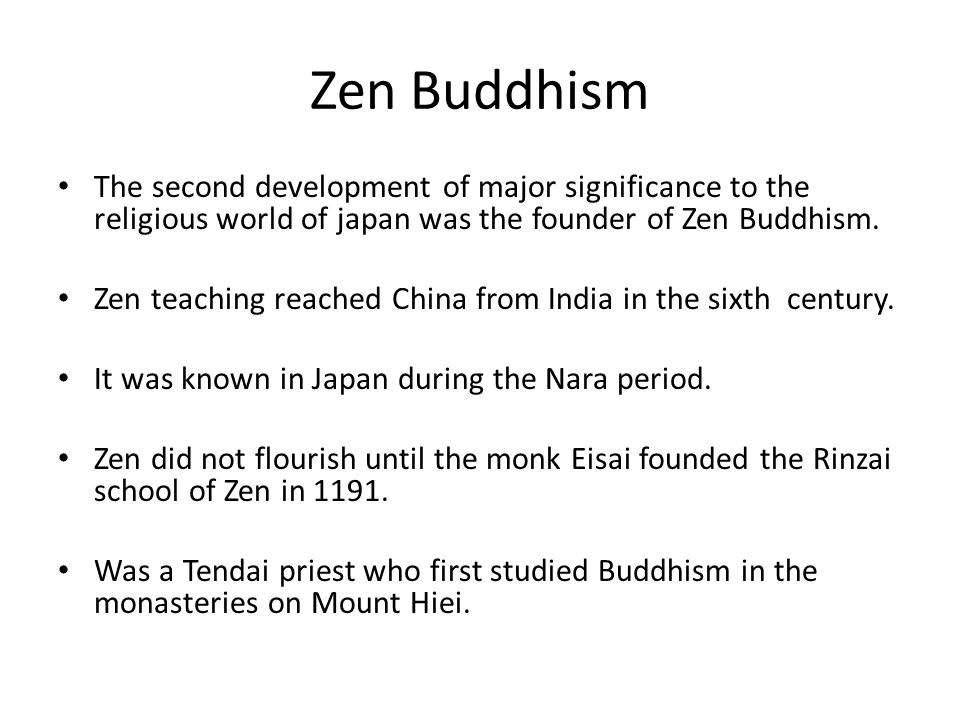The practice saw its origins in China Japan Vietnam and Korea and later on it became popular in the western world. But what exactly is Zen.
Zen Buddhism is a school derived from the Mahayana Tradition.

What is zen buddhism. Zen Buddhism is a very simple focused and stripped-down version of Buddhism. Its distinct practices are often the ones Western audiences first think of when the word Buddha or Buddhist is mentioned. Historically Zen practice originated in China Korea Japan and Vietnam and later came to in the West.
Without it there is no Zen. A Mahayana movement of Buddhism introduced into China in the 6th century ad. Zen Buddhism is a mixture of Indian Mahayana Buddhism and Taoism.
One of its defining features is the utilization of seemingly nonsensical questions or statements known as koans. In China it is called Chan Buddhism. The discipline and practice of this sect.
It follows the same basic teachings of the Buddha and it has found a very fertile soil in Japan and later in the western world. Literally the word means meditation in Sanskrit. It is a school that emphasises personal insight practice.
The practice of zazenmeditationis a way of realizing the non-dualistic vibrant subtle and interconnected nature of all life. Because the Chinese term is in turn a transliteration of the Sanskrit term dhyana however Zen owes its historical origin to early Indian Buddhism where a deepened state of meditation called samadhi was singled out as one of the three components of study a Buddhist was required to master the other two being an observation of ethical precepts sila and an embodiment of nondiscriminatory wisdom prajna. These spiritual truths are the truth of the origin of suffering the truth of the ending of suffering.
Zen exerts an unusually large influence on the worlds perception of Buddhism. It has incorporated some of the Japanese traditional arts into its practices as a form of training for attaining the goals of Buddhism. Instead it focuses on personal experiences.
According to tradition it was the Indian monk Bodhidharma who brought Zen Buddhism to China in the 5th century CE. It was this path toward realization that was shown some 2500 years ago by the Indian prince Siddhartha Gautama who came to be known as Shakyamuni Buddha. Buddha simply means awakened one.
The practice of Zen meditation or Zazen 座禅- za meaning sitting and Zen meaning meditation in Japanese is the core of Zen Buddhism. What do Zen Buddhists practice. The scholarly answer to that question is that Zen is a school of Mahayana Buddhism that emerged in China about 15 centuries ago.
Zen takes many forms as each culture that embraced it did so with their own emphases and tastes. Zen Buddhism is one of several sub-schools of Mahayana Buddhism which is itself the larger of the two major interpretations of Buddhist philosophy. Three Zen practitioners sit zazen their traditions most iconic practice on a sesshin retreat in France.
Chan is the Chinese rendering of the Sanskrit word dhyana which refers to a mind absorbed in meditation. Zen Martial Arts Zen martial arts Zen have had a strong influence on the development of martial arts in Japan. It is meditation-based and does not rely on scriptures or rituals like other forms of Buddhism.
What is Zen Buddhism. Zen is a type of Buddhism that originated in China. Zen Buddhism is a distinctive branch of Mahayana Buddhism one of the leading Buddhist traditions.
What is Zen Buddhism. Godong Alamy Stock Photo Of the many ways to practice Zen Buddhism perhaps the most iconic is zazen which literally means sitting Zen but is often referred to as Zen meditation. The essence of Zen is.
Zen meditation is a way of vigilance and self-discovery which is practiced while sitting on a meditation cushion. Another characteristic of Zen Buddhism is the use of zazen. Not relying on scripture doctrine or ritual Zen is verified by personal experience and is passed on from master to disciple hand to hand ineffably through hard intimate training.
The Four Noble Truths represents the essence of the Buddhas teachings the core of Buddhism. And into Japan in the 12th century that emphasizes enlightenment by means of meditation and direct intuitive insights. Thien is a school of Mahayana Buddhism that originated in China during the Tang dynasty known as the Chan School Chanzong 禪宗 and later developed into various schools.
A verse ascribed to him sums up this teaching succinctly. It began in China spread to Korea and Japan and became very popular in the West from the mid 20th century. Zen Buddhism is a stripped-down determined uncompromising cut-to-the-chase meditation-based Buddhism that takes no interest in doctrinal refinements.
Zen is the Japanese name for a Buddhist tradition practiced by millions of people across the world. Historically Zen developed as a blend of Chinese Buddhism and Taoism. Zen is a Japanese term for a Buddhist tradition which is practiced by people all over the world.
The Zen jp school arose in China where it is known as Chan which means meditation.
